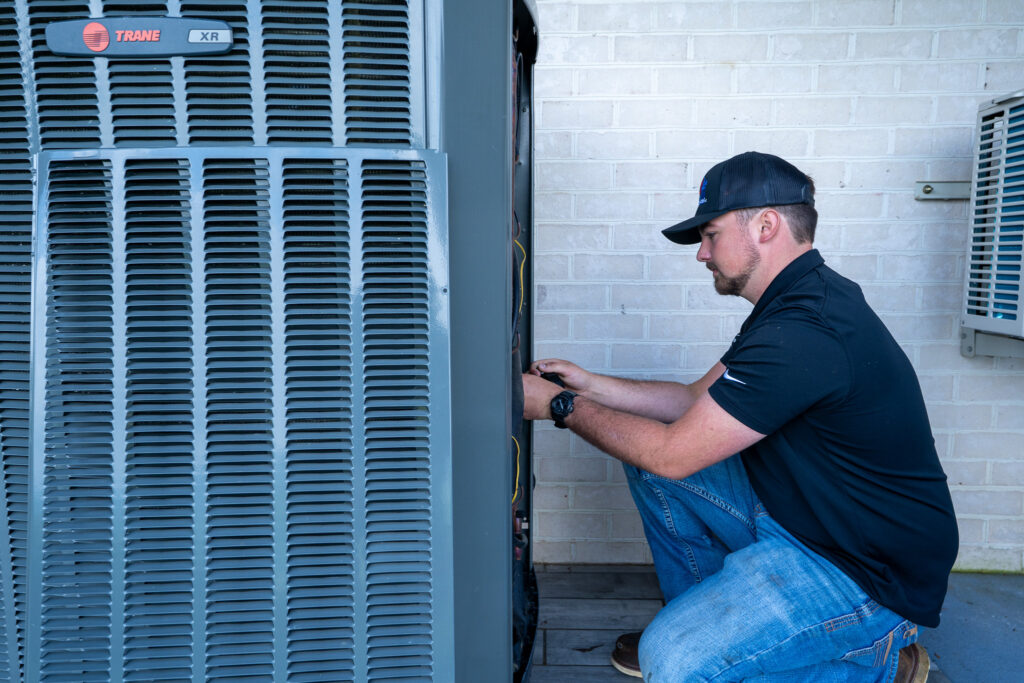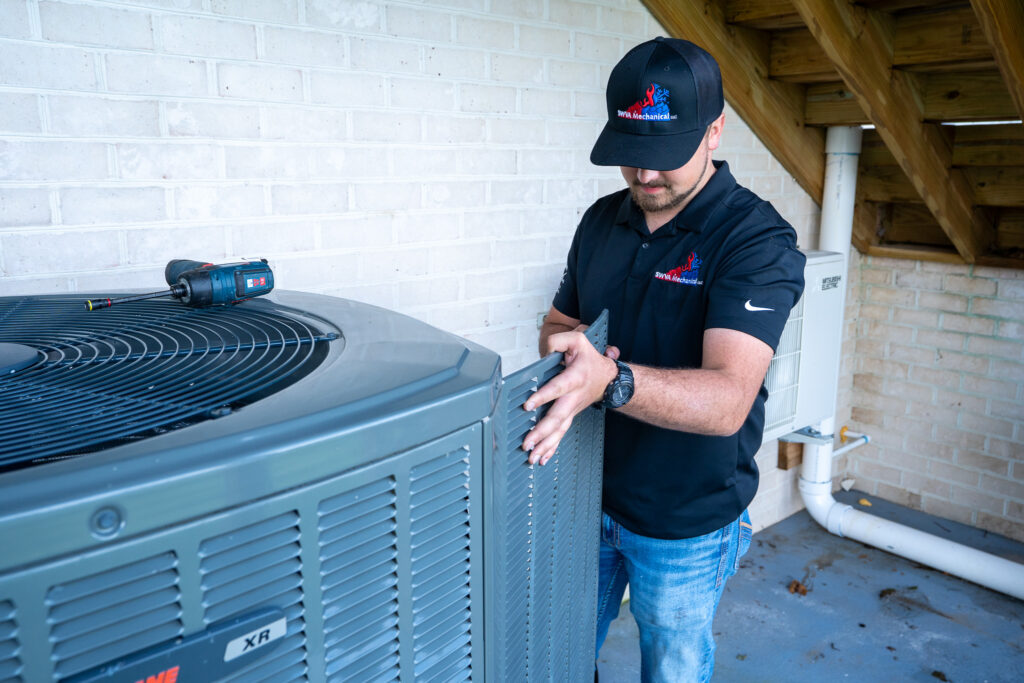When the warm, humid days of a Virginia summer settle in, a powerful and reliable air conditioner is not just a luxury; it is the essential heart of a comfortable and healthy home. We depend on our AC systems to provide a cool retreat from the oppressive heat. However, when a system begins to fail, it can quickly disrupt our comfort, drive up energy bills, and, if ignored, lead to a complete and costly breakdown. The key to avoiding a mid-summer crisis is to recognize the early warning signs of trouble.
Most air conditioning systems will provide clear clues that a component is failing or that the unit is under significant strain long before it shuts down completely. By learning to identify these critical signals, homeowners can take proactive steps to address small issues before they escalate into major, expensive repairs. This information will detail the five biggest and most common warning signs that your air conditioner needs immediate professional service. Paying attention to your system’s performance is the best way to save money, extend its lifespan, and ensure your home remains a cool sanctuary all season long.
The Urgency of Action: Why Timely AC Service Is Critical
The climate in Southwest Virginia places a unique and significant strain on our air conditioning systems. The combination of high summer temperatures and persistent humidity forces our units to run for long, continuous hours to keep our homes cool and dry. This demanding workload can exacerbate any small, underlying issues within the system, accelerating wear and tear on its mechanical and electrical components. What might be a minor problem in a milder climate can quickly become a serious failure point during one of our summer heatwaves.
Delaying a necessary repair is a costly gamble. A struggling air conditioner is an inefficient one, meaning it has to consume more electricity to produce the same amount of cooling, which will be directly reflected in higher monthly energy bills. Furthermore, when one component is failing, it often puts additional stress on other parts of the system, which can cause a chain reaction of damage. For example, a failing fan motor can cause the compressor, the most expensive part of your AC, to overheat and fail prematurely.
The most effective way to protect your investment and your comfort is to address any problems as soon as they arise. This is where a partnership with a licensed, local HVAC contractor like SWVA Mechanical becomes invaluable. Our experienced technicians can provide a fast, accurate diagnosis to pinpoint the root cause of the problem and perform a professional repair, preventing a minor inconvenience from turning into a complete and disruptive system failure.
Sign #1: Warm Air Coming From Vents
One of the most obvious and frustrating signs of an AC problem is when the system is running but the air coming out of your vents is not cold. If the fan is blowing, but the air is room-temperature or warm, it is a clear indication that the cooling cycle itself has been compromised. Your system is now functioning as a very expensive fan, consuming a significant amount of electricity without providing any of the cooling relief your family needs.
This problem can be traced back to several serious issues. The most common cause is a refrigerant leak. Refrigerant is the specialized fluid that absorbs heat from your indoor air, and if the system has lost its charge due to a leak, it has lost its ability to cool. Another potential culprit is a failed compressor, the heart of the outdoor unit that is responsible for pressurizing and circulating the refrigerant. Dirty or clogged coils, both indoors and outdoors, can also prevent the necessary heat exchange from occurring, resulting in warm air.
Continuing to run your air conditioner while it is blowing warm air can cause severe and often irreversible damage to the compressor. Before you call for professional service, there are a couple of quick checks you can perform. First, ensure that your thermostat is set to the “Cool” mode and that the target temperature is set several degrees below the current room temperature. If these settings are correct and the problem persists, you should turn the system off at the thermostat to prevent further damage and contact a professional for immediate service.
Sign #2: Weak or Reduced Airflow
Another critical sign that your air conditioner is in distress is a noticeable decrease in the amount of air coming from your supply vents. A healthy system should produce a strong, steady stream of air. If you notice that the airflow has become weak or that some rooms are receiving very little air at all, it means there is an obstruction somewhere in the system that is restricting its ability to circulate air effectively. This not only diminishes your comfort but also puts a major strain on your equipment.
The number one cause of restricted airflow is a severely clogged air filter. The filter is designed to trap dust and debris, but if it is not changed regularly, it can become so saturated that it chokes off the flow of air. Other potential causes include a failing blower motor, which is the powerful fan responsible for pushing the air through your ducts, or a blockage or disconnection within the ductwork itself.
Ignoring weak airflow can lead to a more serious and damaging problem: a frozen evaporator coil. The indoor coil needs a constant flow of warm air passing over it to prevent its temperature from dropping below freezing. When airflow is restricted, the coil can become encased in a solid block of ice, which will completely stop the cooling process and can lead to water damage in your home when it melts. The best preventive tip is to commit to a regular schedule of checking and replacing your air filter every one to three months.
Sign #3: Strange Noises During Operation
Your air conditioner is designed to operate with a consistent and relatively quiet hum. When you begin to hear new, loud, or jarring noises, it is a clear signal that a mechanical component is failing. These sounds are not normal operating noises and should be investigated immediately to prevent a minor issue from turning into a catastrophic and expensive failure.
A high-pitched squealing or a metallic grinding sound is a serious red flag. This often indicates that the bearings in one of the system’s motors, either the indoor blower motor or the outdoor condenser fan motor, have worn out and are failing. If you hear these sounds, you should shut the system down immediately to prevent the motor from seizing up completely. A banging, rattling, or clanking noise can be a sign of a loose part, such as an unbalanced fan blade, a loose connecting rod in the compressor, or other components that have come loose. These loose parts can cause a chain reaction of damage as they strike other parts of the unit.

You should also be on alert for a distinct hissing or bubbling sound coming from your refrigerant lines or the outdoor unit. This is the classic indicator of a refrigerant leak. Because these noises often signal an impending mechanical failure, they should never be ignored. When you call for service, try to describe the type of sound and where it seems to be coming from to your HVAC technician, as this information can help them begin to diagnose the problem even before they arrive.
Sign #4: Unpleasant Odors Coming From the System
Your sense of smell can be a powerful tool for detecting serious problems with your HVAC system. Any strong or unusual odor that is distributed through your vents when the system is running should be treated as a serious warning sign, as these smells can indicate issues ranging from poor air quality to an immediate safety hazard.
A damp, musty odor, sometimes described as smelling like dirty socks, is a telltale sign of mold or mildew growth somewhere within your system. This is often caused by a drainage problem that has allowed water to stagnate on the indoor evaporator coil or in the drain pan. As the blower runs, it circulates these mold spores throughout your home, which can have a significant negative impact on your indoor air quality and can trigger symptoms for those with allergies or asthma.
A sharp, acrid, or electrical burning smell is a much more urgent and dangerous signal. This indicates that a motor is overheating, a wire has shorted out, or another electrical component is failing. This poses a serious fire risk, and if you ever smell this, your first action should be to shut off all power to your HVAC system at the circuit breaker and call for emergency service immediately. Because of the potential health and safety risks, any persistent, unpleasant odor from your system is a problem that cannot wait for regular service hours.
What to Do If You Notice Any of These Signs
If your air conditioner begins to exhibit any of these serious warning signs, your first priority should always be safety. If you smell a burning odor or suspect any other major electrical issue, go directly to your home’s main breaker panel and shut off the power to your air conditioning and furnace units. If you are not in immediate danger, you can perform a couple of quick, simple checks. Look at your thermostat to ensure its settings are correct, and do a visual inspection of your air filter to see if it is severely clogged.
If these simple checks do not resolve the issue, or if the problem is clearly mechanical, such as a loud noise or a major leak, the next and most important step is to contact a licensed HVAC technician. Do not attempt to open up the unit or perform any DIY repairs on complex components, as this can be dangerous and can often cause more extensive damage.

The benefits of acting quickly are significant. By addressing the problem promptly, you can often prevent a small, contained issue from escalating into a much larger and more expensive one. You will restore your family’s comfort more quickly and will also help to extend the long-term life of your entire system.
How to Prevent Emergency AC Repairs
The most effective way to handle an emergency AC repair is to prevent it from ever happening. The vast majority of air conditioning failures are the result of neglected maintenance. A proactive approach to caring for your equipment is the best strategy for ensuring it remains reliable and efficient throughout the demanding summer season.
The cornerstone of this approach is scheduling an annual, professional tune-up every spring. This preventative service allows a trained technician from SWVA Mechanical to thoroughly inspect, clean, and test every critical component of your system before the summer heat puts it under stress. During this visit, we clean the coils, check the refrigerant levels, test the capacitors and other electrical parts, and clear the drain line. This tune-up not only ensures your system is running at its peak efficiency, which saves you money on your utility bills, but it also allows us to identify and resolve small, developing issues before they can cause a mid-summer breakdown.
Your home’s air conditioner is a complex system, and it will provide you with clear signals when it is in need of attention. By learning to recognize the five most common warning signs, warm air, weak airflow, strange noises, unpleasant odors, and improper cycling, you can become an empowered homeowner. Paying attention to these clues and acting promptly is the best way to protect your system from catastrophic failure, save money on costly repairs, and ensure your home remains a comfortable sanctuary.
Ignoring these problems is a gamble that can leave you and your family sweltering on the hottest day of the year. If you notice any of these critical signs, we encourage you to contact the trusted local experts at SWVA Mechanical for immediate, professional AC service. Our team is ready to serve our neighbors throughout Southwest Virginia with fast, reliable, and honest repairs.


